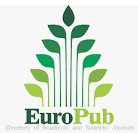Groundwater Quality Assessment in Iworoko-Ekiti Environs, South-Western Nigeria using Chemical Indices: Implications for Irrigation and Household Utilities
Keywords:
Iworoko-Ekiti, groundwater quality, Revelle Index, Kelly Index, Contamination Factor, Degree of Contamination, Magnesium Adsorption Ratio, Indices of Base Exchange, Total HardnessAbstract
Groundwater quality of Iworoko-Ekiti and environs for irrigation and domestic purposes has partly been established using chemical indices. Groundwater quality assessment in the area is of great importance because of the influence of various activities in the area. The area is thickly populated by citizens and higher institution students across Nigeria. At the moment, sanitary conditions are very poor as the main occupations are trading and farming. Nineteen hand-dug wells were randomly sampled within the settlement. Flame photometry and spectrometry were used for cations and anions analyses respectively. Average values of pH, EC and TDS are 7.02, 342µS/cm and 230ppm. The average trend of major cations and anions concentrations is Ca2+>Na+>Mg2+>K+ and HCO3->Cl?>SO42->CO32- respectively. Average values of Degree of Contamination and Revelle Index are 14 and 0.6 respectively. SAR, MAR, %Na, KI, TH, CIA-1 and CIA-2 has an average value of 0.7, 37.4, 24.8, 0.3, 162ppm, 0.4 and 0.9 respectively. Based on these values, the water is suitable for irrigation. In general, 31.6% of the hand-dug wells are slightly acidic and 10.5% have Revelle index >1 above recommended values respectively. 10.5% from the hand-dug wells have KI above one, 5.3% has MAR above recommendation making them unfit for irrigation purposes. Hence, majority of the wells are suitable for irrigation with exception of a few wells. However, the elevated Cl- concentrations in all the wells, make them unfit for human consumption. Weathering of migmatite and granite gneisses together with anthropogenic activities really contributed to the chemistry of the groundwater.
Downloads
Published
Issue
Section
License
Copyright (c) 2023 Journal of Sustainable Natural Resources

This work is licensed under a Creative Commons Attribution-NonCommercial-ShareAlike 4.0 International License.











